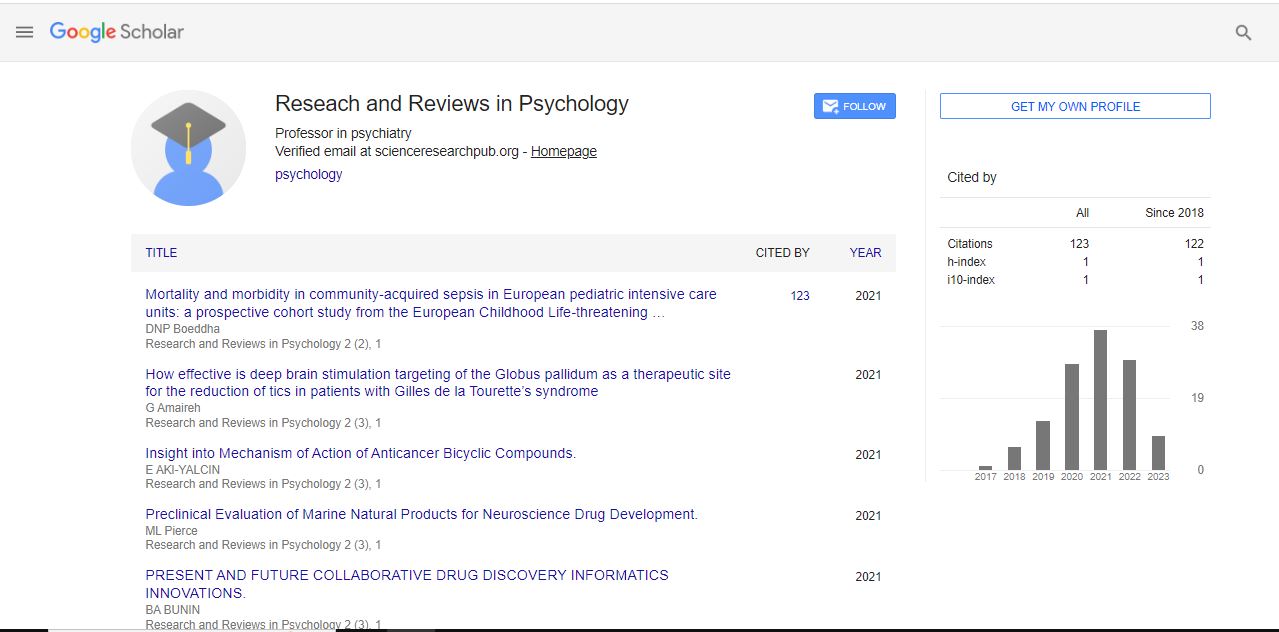About the Journal
Research and Reviews in Psychology is an international, Peer reviewed, Open access Journal, aims to publish research papers in any area of experimental psychology. The Journal welcomes original research contributions, critical reviews, empirical and theoretical reports across the range of latest psychological research focusing on the understanding of human behavior and cognition. Article emphasizing advancements of Scientific Psychology are welcomed.
Research and Reviews in Psychology is devoted to explore cutting-edge science of Psychology spanning all Psychology and Cognate disciplines: Clinical Psychology, Affective Science, Cognitive Psychology, Developmental Psychology, Behavioral Psychology, Neuropsychology, Health Psychology and Social Psychology. In addition to regular submissions, the journal also publishes articles which deal with perception, attention, language, memory, and cognitive and/or affective control, numerical and motor cognition.
Scope of journal is not merely delimited with specific keywords but for convenience to authors, here we included some key areas of research:
- Biological psychology
- Clinical psychology
- Cognitive psychology
- Neuropsychology
- Criminal Psychology
- Developmental Psychology
- Health psychology & Medicine
- Forensic Psychology
- Experimental Psychology
- Organizational Psychology & Management
- Educational Psychology & School Psychology
- Social Psychology & Social Processes
The Journal engages the Editorial Manager System for efficient management of online submission, tracking and processing of the articles. All the submitted manuscripts are subjected to will undergo double blind peer review process, executed by the editorial board members of Research and Reviews in Psychology or outside experts; at least two independent reviewers agreement monitored by editor approval is necessary for approval of any citable manuscript. Authors may submit manuscripts and track their development through the system, expectantly to publication. Reviewers can load manuscripts and submit their opinions to the editor. Editors can accomplish the whole revise submission/review /publish process.
Biological psychology
Biological psychology, also called physiological psychology or behavioral neuroscience, the study of the physiological bases of behaviour. Biological psychology is concerned primarily with the relationship between psychological processes and the underlying physiological events—or, in other words, the mind-body phenomenon. Its focus is the function of the brain and the rest of the nervous system in activities (e.g., thinking, learning, feeling, sensing, and perceiving) recognized as characteristic of humans and other animals.
Clinical psychology
Clinical psychology is the psychological specialty that provides continuing and comprehensive mental and behavioral health care for individuals and families; consultation to agencies and communities; training, education and supervision; and research-based practice. It is a specialty in breadth — one that is broadly inclusive of severe psychopathology — and marked by comprehensiveness and integration of knowledge and skill from a broad array of disciplines within and outside of psychology proper. The scope of clinical psychology encompasses all ages, multiple diversities and varied systems.
Cognitive psychology
Cognitive psychology is the scientific study of mind and mental function, including learning, memory, attention, perception, reasoning, language, conceptual development, and decision making. The modern study of cognition rests on the premise that the brain can be understood as a complex computing system.
Neuropsychology
Clinical Neuropsychology is a specialty in professional psychology that applies principles of assessment and intervention based upon the scientific study of human behavior as it relates to normal and abnormal functioning of the central nervous system. The specialty is dedicated to enhancing the understanding of brain‐behavior relationships and the application of such knowledge to human problems.
Criminal Psychology
Criminal psychology is a discipline that merges psychology and criminal justice. Trained in the principles of human behavior, criminal psychologists work closely with attorneys, the courts, law enforcement agencies, and various other stakeholders involved in civil and criminal cases. A criminal psychologist, who is sometimes referred to as a forensic psychologist, works in an area the blends psychology with the field of criminal justice.
Developmental Psychology
Developmental psychology is the study of human growth and development. This may include physical, mental, emotional, intellectual, and social changes and milestones. By studying these developmental changes, psychologists can have a better understanding of how people change and grow during different stages of their lives. Developmental psychology helps us understand how a person grows, ages, and develops during different stages in his life. Understanding this allows us to live our lives to the fullest potential possible.
Forensic Psychology
Forensic psychology can be challenging but if you are resilient and willing to help and understand offenders, it could be the career for you. Forensic psychologists are scientist-practitioners. They apply psychological knowledge, theory and skills to the understanding and functioning of legal and criminal justice systems, and to conducting research in relevant areas. They often work in criminal, civil and family legal contexts and provide services for litigants, perpetrators, victims, and personnel of government and community organizations.
Experimental Psychology
Experimental Psychology isn’t a specific branch of psychology, but instead generally refers to standard methods and techniques that psychologist with scientific training use to collect and analyze data. Continue reading to learn how this unique approach to understanding human behavior is utilized by all schools of psychology.
Social Psychology & Social Processes
Social psychology is the scientific study of how people's thoughts, feelings, and behaviors are influenced by the actual, imagined, or implied presence of others. The terms thoughts, feelings, and behaviors include all of the psychological variables that are measurable in a human being. The reference to imagined or implied others suggests that we are prone to social influence even when no other people are present, such as when watching television, or following internalized cultural norms. The study of attitudes is a core topic in social psychology.
Organizational Psychology & Management
Both sides of industrial and organizational psychology became prominent during two different points in history. Industrial psychology, for example, came about during the first World War. Theories and techniques of this type of psychology were applied in order to assign soldiers to jobs and duty stations that suited them best. The organizational side of industrial and organizational psychology, on the other hand, focuses on the organization and workplace as a whole. Increasing productivity and maximizing the performance of an organization as a whole is often covered under this area of industrial and organizational psychology.
Educational psychology
Educational psychology is that branch of psychology in which the findings of psychology are applied in the field of education. It is the scientific study of human behaviour in educational setting.
Fast Editorial Execution and Review Process (FEE-Review Process):
Research and Reviews in Psychology is participating in the Fast Editorial Execution and Review Process (FEE-Review Process) with an additional prepayment of $99 apart from the regular article processing fee. Fast Editorial Execution and Review Process is a special service for the article that enables it to get a faster response in the pre-review stage from the handling editor as well as a review from the reviewer. An author can get a faster response of pre-review maximum in 3 days since submission, and a review process by the reviewer maximum in 5 days, followed by revision/publication in 2 days. If the article gets notified for revision by the handling editor, then it will take another 5 days for external review by the previous reviewer or alternative reviewer.
Acceptance of manuscripts is driven entirely by handling editorial team considerations and independent peer-review, ensuring the highest standards are maintained no matter the route to regular peer-reviewed publication or a fast editorial review process. The handling editor and the article contributor are responsible for adhering to scientific standards. The article FEE-Review process of $99 will not be refunded even if the article is rejected or withdrawn for publication.
The corresponding author or institution/organization is responsible for making the manuscript FEE-Review Process payment. The additional FEE-Review Process payment covers the fast review processing and quick editorial decisions, and regular article publication covers the preparation in various formats for online publication, securing full-text inclusion in a number of permanent archives like HTML, XML, and PDF, and feeding to different indexing agencies.

